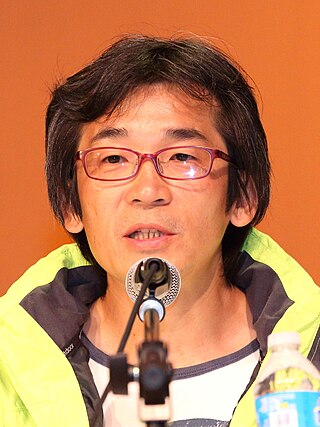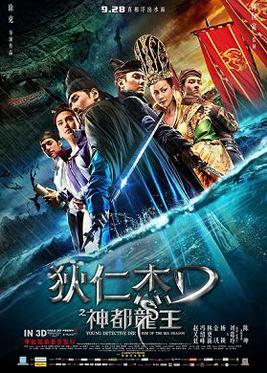Related Research Articles

The cinema of Taiwan or Taiwan cinema is deeply rooted in the island's unique history. Since its introduction to Taiwan in 1901 under Japanese rule, cinema has developed in Taiwan under ROC rule through several distinct stages, including taiyu pian of the 1950s and 1960s, genre films of the 1960s and 1970s, including jiankang xieshi pian, wuxia pian, aiqing wenyi pian, zhengxuan pian, and shehui xieshi pian, Taiwan New Cinema of the 1980s, and the new wave of the 1990s and afterwards. Starting in the second decade of the new millennium, documentary films also became a representative part of Taiwan cinema.

Lin Li-hui, better known by her stage name Shu Qi, is a Hong Kong–Taiwanese actress and model.

Double Vision is a 2002 action horror film directed by Chen Kuo-fu. The plot is about an FBI agent working with a troubled Taiwanese cop to hunt for a serial killer who is embedding a mysterious black fungus in the brains of the victims. It was screened in the Un Certain Regard section at the 2002 Cannes Film Festival.

Hou Hsiao-hsien is a retired Mainland Chinese-born Taiwanese film director, screenwriter, producer and actor. He is a leading figure in world cinema and in Taiwan's New Wave cinema movement. He won the Golden Lion at the Venice Film Festival in 1989 for his film A City of Sadness (1989), and the Best Director award at the Cannes Film Festival in 2015 for The Assassin (2015). Other highly regarded works of his include The Puppetmaster (1993) and Flowers of Shanghai (1998).

The Peony Pavilion, also named The Return of Soul at the Peony Pavilion, is a romantic tragicomedy play written by dramatist Tang Xianzu in 1598. The plot was drawn from the short story Du Liniang Revives For Love and depicts a love story between Du Liniang and Liu Mengmei that overcomes all difficulties. Tang's play diverges from the short story in that it integrates elements of the Ming dynasty, despite being set in the Southern Song.

Timothy Yip Kam-tim is a Hong Kong art director and designer for fiction films. He is best known for his work on the 2000 martial arts film Crouching Tiger, Hidden Dragon, for which he won an Academy Award for Best Art Direction. Yip also won a BAFTA award for the film's costume design. He has been alternatively credited as Tim Yip Kam-tim, Kam Tim Yip, Kam-tim Yip, and Tim Yip.
Kevin Chu or Chu Yen-ping is a Taiwanese film director. Chu once said in an interview that he is "not an artist," but rather "a movie factory that puts out products to match the season", and is compared to Hong Kong director Wong Jing.

This is the filmography of Hong Kong singer, actor and film producer Andy Lau.

Wei Te-sheng is a Taiwanese film director and screenwriter. He directed Cape No. 7, currently the highest grossing domestic Taiwanese film and the second highest-grossing film in Taiwanese film history.

Taipei Municipal Chien Kuo High School is a public high school for boys located in Zhongzheng District, Taipei, Taiwan. The school was established in 1898 during the early years of Japanese rule. Originally named "No. 1 Taihoku High School" (臺北州立臺北第一中學校), it was the first public high school in Taiwanese history. CKHS requires the highest scores on the national senior high school entrance exams. As of July 2021, CKHS's alumni include 1 Nobel Prize laureate (Physics), the only ethnic Chinese Turing Award laureate, 1 Cannes Film Festival Award winner, 1 head of state, at least 5 members of the US National Academy of Sciences, and numerous scholars and public servants. Its female counterpart is the Taipei First Girls' High School.

Fan Wei is a Chinese skit, sitcom and film actor best known for his performances with Zhao Benshan and Gao Xiumin in CCTV New Year's Galas since 1995. In recent years, he has been featured in such films as Cell Phone, A World Without Thieves, If You Are the One and City of Life and Death. He has also acted in several television series produced in mainland China and is a member of the Fàn family.

Hsu Feng is a Taiwanese-born actress and film producer. In the 1970s she was one of the leading actresses of the cinemas of Hong Kong and Taiwan, particularly known for her roles in wuxia films and her work with director King Hu. In 1981 she retired from her career as an actress, but a few years later she returned to the film industry as a producer and went on to produce several award-winning movies. Among them was Chen Kaige's Farewell My Concubine, which won the Palme d'Or (1993) and the BAFTA Award for Best Film not in the English Language (1994) and was nominated for an Academy Award and a César for best foreign film as well.

The Personals is a 1998 Taiwanese comedy-drama film directed and co-written by Chen Kuo-fu, based on Jade Y. Chen's 1992 novel of the same name. The film follows a career woman as she encounters a diverse bunch of men after placing a personal advertisement in the newspaper. It was screened in the Un Certain Regard section at the 1999 Cannes Film Festival. Liu won Best Actress at the 1999 Asia-Pacific Film Festival.
The 2010 Shanghai International Film Festival is the 13th such festival devoted to international cinema to be held in Shanghai, China. It was held from June 12–20, 2010.
The 5th Asian Film Awards was given in a ceremony on 21 March 2011 as part of the Hong Kong International Film Festival.

Young Detective Dee: Rise of the Sea Dragon is a 2013 Chinese action-adventure fantasy mystery film directed, produced, and co-written by Tsui Hark, and a prequel to Tsui's 2010 film Detective Dee and the Mystery of the Phantom Flame. Taiwanese-Canadian actor Mark Chao takes over from Andy Lau as a young Dee Renjie, while William Feng, Kenny Lin, Ian Kim, and Angelababy co-star alongside a returning Carina Lau from Mystery of the Phantom Flame, rounding up the ensemble cast. The film was shot in native 3D.
Jimmy Huang is a Taiwanese film producer.

Detective Dee: The Four Heavenly Kings is a 2018 Chinese action-adventure fantasy mystery film directed, produced, co-edited and co-written by Tsui Hark, and the third film in his Detective Dee film series. Despite dropping the "Young Detective Dee" title, it is a sequel to 2013's Young Detective Dee: Rise of the Sea Dragon, and as such similarly acts as a prequel to the first installment, Mystery of the Phantom Flame. Like its immediate predecessor, it was filmed in 3D.
Ying Da is a Chinese actor and director, best known in film for portraying Louie Wang in Big Shot's Funeral (2001), Ni Zhengyu in The Tokyo Trial (2006) and Jin Shenghuo in The Message (2009), and has received critical acclaim for his television work, particularly as Zhao Xinmei in Fortress Besieged (1990) and Leng Zixing in The Dream of Red Mansions (2008). As a director, Ying Da is best known for bringing the multi-camera format to several comedy television shows, such as I Love My Family (1993), We Are A Family (2013), Idler: Sister Ma (1999), and Sister Ma and Her Neighborhoods (2000).
References
- ↑ "Festival de Cannes: The Personals". festival-cannes.com. Archived from the original on 7 October 2012. Retrieved 10 October 2009.
- ↑ Teng Sue-feng. Translated by David Smith. "Chen Kuo-fu--Back With a "Message" Archived 5 October 2013 at the Wayback Machine . Taiwan Panorama. December 2009.